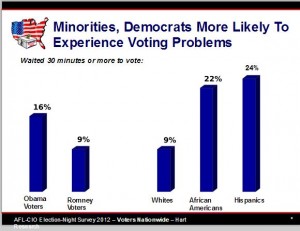Miami-Dadistan Finishes Absentee, Provisional Ballot Counting, Media Still Doesn’t Call Floriduh
Miami-Dade Supervisor of Elections Penelope Townsley took great joy in pointing out to the Miami Herald that her county beat three other large Florida counties in finishing counting absentee and provisional ballots on Thursday, the third day of ballot counting:
Townsley made note of the fact that Miami-Dade, the state’s largest county, finished ahead of three other big Florida counties — Broward, Palm Beach and Duval.
Broward County finally finished counting ballots at about 11:30 p.m. Thursday, said Broward elections spokeswoman Evelyn Perez-Verdia. Palm Beach and Duval were still tabulating their absentees as of Thursday afternoon.
Florida’s official tally of county-by-county status indicates that Miami-Dadistan has indeed finished its absentee and provisional ballot counting. The tally shows Palm Beach and Duval still counting absentee ballots. However, perhaps because this tally shows that only 19 of the 67 counties at the time of this writing have counted their provisional ballots (I’ve seen no media outlets pointing this detail out), major media outlets such as CNN and the New York Times still have their electoral college counts stuck on 303 to 206, with Floriduh’s 29 electoral votes still not assigned to either candidate. Earlier Thursday, the Romney campaign appeared to concede defeat in Florida, but that also did not lead to moving the scoreboards.
I can’t help wondering if the large number of counties not yet finishing the counting of all of their provisional ballots might be due to the way that large numbers of people were moved to new precincts this year with poor notification that their voting site changed. Poorly trained poll workers may have sent some of these voters to provisional ballots rather than checking to see if the voters had been moved to other nearby voting locations where they would have voted normally.
Despite Townsley trying to claim that her county did an overall good job, she still completely sidestepped questions about what went wrong in the precincts where people stood in line until after 1 am to vote. From the Miami Herald article linked above:
Townsley said her elections staff was prepared for the presidential race turnout and lengthy ballot, which included numerous county and state amendment questions. She said she deployed 200-plus more scanning machines and 400 more poll workers for this election compared with 2008, and made trouble-shooting decisions Tuesday to shift resources where needed.
Asked why there were waits up to six hours at various precincts in the Brickell area of Miami, as well as in West Kendall, Country Walk, Goulds and Homestead, Townsley ducked the question without providing details.
“That is precisely the reason we will be conducting an after-action report to determine what actually went wrong,” she said. “We will learn from those lessons.”
Grover Norquist-style small government advocate Miami-Dadistan Mayor Carlos Gimenez feels that he is on top of the situation. His brilliant plan on Thursday afternoon, according to the Herald, was to assemble a task force (which appears to consist only of county commissioners) to find out what went wrong. I’m guessing that these geniuses won’t trouble their little minds with the possible explanation that cutting government to a size where it can’t function properly might have played a role in leading the world to conclude that they are managing a third world local government.
Meanwhile, Grover Norquist-style small government advocate Foriduh Governor Rick Scott is doing his best to hide from the controversy, but he was forced to comment Thursday:
Florida Governor Rick Scott, heavily criticized when he refused to use his emergency powers to extend the number of early voting days in the state, now says he’s willing to look at whether changes are needed to make voting go smoother.
/snip/
At an event in Orlando on Thursday morning, Gov. Scott was asked about the voting problems in Florida.
“I’m going to be sitting down with the Secretary of State soon to go through all of the issues that might have come up during the election and make sure we always keep improving,” said Scott.
Overall though, the Governor said he was happy with the election process in Florida this year because so many people came out to vote.
Considering the extreme lengths that Scott and his Republican legislature went to in trying to suppress voter turnout, that last bit where he said he was happy with high turnout must have been a really painful thing for him to say.

